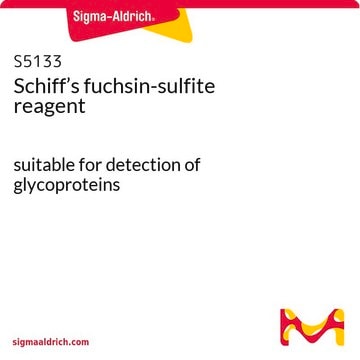S9000
Sodium metabisulfite
ReagentPlus®, ≥99%
Synonym(s):
Sodium disulfite, Sodium pyrosulfite
About This Item
Recommended Products
Quality Level
product line
ReagentPlus®
Assay
≥99%
form
powder
pH
4.5 (20 °C, 50 g/L)
mp
>300 °C (lit.)
SMILES string
[Na+].[Na+].[O-]S(=O)S([O-])(=O)=O
InChI
1S/2Na.H2O5S2/c;;1-6(2)7(3,4)5/h;;(H,1,2)(H,3,4,5)/q2*+1;/p-2
InChI key
HRZFUMHJMZEROT-UHFFFAOYSA-L
Looking for similar products? Visit Product Comparison Guide
Related Categories
Application
- Sickle Erythrocyte Health Index: Discusses the use of sodium metabisulfite in stabilizing red blood cells for advanced computational analysis, crucial for the diagnosis and management of sickle cell disease (Ansong-Ansongton YON, Adamson TD, 2024).
- Chemical and Thermal Treatment for Drying Cassava Tubers: Explores sodium metabisulfite′s role in enhancing the drying process of cassava, focusing on optimizing microstructure and dehydration kinetics, which is vital for food preservation and processing (Nainggolan EA, Banout J, Urbanova K, 2023).
- Anionic Bio-flocculants from Sugarcane: Discusses the development of bio-flocculants using sodium metabisulfite for the purification of sucrose, demonstrating its potential in enhancing the sustainability of sugar processing industries (Leão S, Magalhães S, et al., 2023).
Other Notes
Legal Information
Signal Word
Danger
Hazard Statements
Precautionary Statements
Hazard Classifications
Acute Tox. 4 Oral - Eye Dam. 1
Supplementary Hazards
Storage Class Code
11 - Combustible Solids
WGK
WGK 3
Flash Point(F)
Not applicable
Flash Point(C)
Not applicable
Certificates of Analysis (COA)
Search for Certificates of Analysis (COA) by entering the products Lot/Batch Number. Lot and Batch Numbers can be found on a product’s label following the words ‘Lot’ or ‘Batch’.
Already Own This Product?
Find documentation for the products that you have recently purchased in the Document Library.
Customers Also Viewed
Our team of scientists has experience in all areas of research including Life Science, Material Science, Chemical Synthesis, Chromatography, Analytical and many others.
Contact Technical Service












